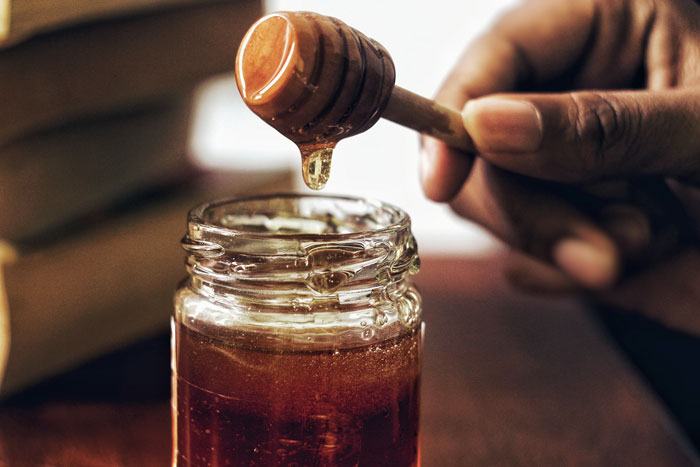Dogs and honey might seem like an unusual combo, but can you feed your dog honey safely? That’s our mystery to solve! From the taste of honey to its health benefits for dogs, we’re here to uncover the sweet truth.
Is honey safe for dogs to eat, or does it pose risks like causing your dog to gain weight? This quest explores if a thin layer of honey is safe for dogs and if it’s found in honey that could help calm ailments like sore throats.
- Honey contains antioxidants that may boost dogs' immune systems and overall health.
- Honey has antimicrobial properties that can aid in wound healing for dogs.
- Dogs should only consume honey in moderation, as excessive intake can cause weight gain.
- Always consult a vet before giving honey to dogs, especially if they have allergies or diabetes.
We’ll navigate the uncharted territory of honey for dogs, discovering if it’s safe to give honey to your dog and even its role in well-balanced dog food. Remember, always consult your vet first before let your dog lick honey to ensure it aligns with your dog’s diet.
Join us as we untangle the mysteries surrounding dogs and honey, from allergies to potential health benefits—let’s dig into the pawsitively interesting world of dogs and honey together!
The information provided herein is for informational purposes only. Please refer to our disclaimer for more details..
What health benefits does honey have for dogs?
Image credits: Camylla Battani
Honey isn’t just a delectable treat; it holds potential health benefits for our canine companions as well. Embedded within its golden richness are components that offer promising advantages for dogs.
Antioxidants, prevalent in honey, act as defenders, shielding a dog’s system by combating harmful free radicals, fortifying their immune defenses, and conceivably enhancing their overall health. Manuka honey can be used as a potent combatant against bacteria and can potentially expedite wound healing.
While anecdotes suggest honey’s potential to help soothe a dog’s sore throat, conclusive evidence remains elusive. Additionally, trace amounts of essential nutrients like calcium, potassium, and magnesium, can be found augmenting a dog’s nutritional profile marginally.
However, despite these appealing attributes, the concrete scientific substantiation for honey’s precise benefits in dogs remains somewhat limited.
As a result, exercising prudence and seeking guidance from a veterinarian before incorporating honey into a dog’s dietary regimen is crucial to ensure their safety and well-being. Honey’s role in addressing allergies or gastrointestinal issues in dogs requires attention for its lack of conclusive research.
In short, here are the common claims about benefits of raw honey:
Antioxidants
Honey is a treasure trove of antioxidants, including flavonoids and phenolic compounds, which play crucial roles in promoting health and well-being in dogs.
Flavonoids: These are a diverse group of antioxidants found abundantly in honey. They possess strong antioxidant properties that combat the harmful effects of free radicals.
Free radicals are unstable molecules that can cause cellular damage, leading to issues like tissue inflammation, aging, and various diseases.
Flavonoids in honey act as scavengers, neutralizing these free radicals and mitigating their destructive impact on cells. By doing so, they contribute to the overall maintenance of cellular health in dogs.
Phenolic Compounds: Honey contains several phenolic compounds like phenolic acids and flavonoids.
These compounds exhibit potent antioxidant effects, aiding in the defense against oxidative stress. They work synergistically with other antioxidants, enhancing the body’s defense mechanisms.
The presence of these phenolic compounds in honey elevates its antioxidant potency, providing dogs with additional protection against cellular damage.
When dogs consume honey, these antioxidants work harmoniously to bolster their immune system, potentially reducing the risk of certain diseases and supporting overall health.
By neutralizing free radicals and reducing oxidative stress, honey’s antioxidants contribute to cellular health maintenance, potentially benefiting a dog’s vitality and longevity.
However, it’s important to note that while honey offers antioxidants, its primary role in a dog’s diet should be considered alongside a balanced and appropriate canine nutrition plan.
Antimicrobial Properties
Manuka honey, in particular, has been studied for its potent antimicrobial effects and anti-inflammatory properties. It contains a compound called methylglyoxal (MGO) that gives it strong antibacterial properties.
Medical grade manuka honey has been used in wound care due to its ability to inhibit the growth of certain bacteria, aiding in healing and reducing the risk of infections.
Soothing Qualities
Honey is thought to have a soothing effect due to its texture and composition. It might help coat and soothe a dog’s throat if it’s irritated or sore.
Some people believe it can also provide mild relief for stomach discomfort, but scientific evidence supporting this is limited.
Nutritional Content
Honey contains small amounts of essential nutrients like calcium, potassium, and magnesium. While these quantities are relatively low, they contribute a bit to a dog’s overall nutrient intake.
However, it’s essential to note that a dog’s primary nutrition should come from a balanced diet formulated for their specific needs. Offer your dog small quantities of this natural sweetener to check for allergic reaction (as with introducing any new food). Pollen is one of the most common allergen, and as raw honey has quite an amount of pollen it can cause an allergic reaction.
How much honey is safe for dogs?
Image credits: Arwin Neil Baichoo
The safe quantity of honey for dogs hinges largely based on their size. Generally, smaller dogs should consume less honey compared to larger breeds. Although honey is non-toxic to dogs, honey can lead to dog to gain weight due to the high sugar content found in honey.
As a rough guide:
- Extra-small dogs (2-20 pounds) can be given around 1/4 teaspoon.
- Small dogs (21-30 pounds) may have approximately 1/2 teaspoon.
- Medium dogs (31-50 pounds) could safely enjoy around 1 teaspoon.
- Large dogs (51-90 pounds) might be given roughly 2 teaspoons.
- Extra-large dogs (91+ pounds) could handle about 1 tablespoon.
It’s crucial to emphasize that these are approximate amounts and should be offered as occasional treats, constituting merely 10% of a dog’s daily diet.
Consulting a veterinarian if your dog if your pet has health concerns such as diabetes or obesity or allergy, is imperative. Moderation is key to ensure your furry friend’s happiness and well-being!
Be careful when making homemade dog treats and use small amount of honey to ensure well-balanced dog food for a healthy dog.
Can honey help with kennel cough?
While honey is often considered soothing for throat irritation, including in humans, its effectiveness in managing kennel cough in dogs might be limited.
Kennel cough, a contagious respiratory condition in canines, results from viruses or bacteria causing irritation and inflammation in the upper respiratory tract.
Honey’s viscosity might offer a coating effect, potentially easing the discomfort associated with the persistent cough caused by kennel cough.
However, it’s important to understand that kennel cough usually requires specific treatment, such as antibiotics or cough suppressants, depending on the underlying cause and severity of the condition. Honey, while providing mild relief for a sore throat, doesn’t directly address the infection-causing cough.
If your dog shows signs of kennel cough—such as a dry, honking cough, nasal discharge, or mild fever—it’s essential to seek veterinary advice. A veterinarian can accurately diagnose the condition and recommend appropriate treatment options to manage the infection and alleviate your dog’s discomfort.
Speak to your vet first as sore throats do not always require thorough medical attention but just a little honey. Honey, if used, should be seen as a complementary measure and not a substitute for veterinary care in addressing this disease.
As our investigation into the interaction between dogs and honey unfolds, it becomes evident that honey offers more than just its sweet taste.
Beyond being a delectable treat, it holds promise as a potential medicinal aid for our beloved canine companions. The antioxidants within honey serve as staunch defenders, bolstering a dog’s immune system and potentially alleviating allergy-related concerns.
Notably, Manuka honey’s potent antimicrobial properties showcase its ability to combat bacteria and assist in wound healing. While anecdotes suggest honey might help in managing certain health conditions and calming a dog’s throat, empirical scientific validation regarding its precise benefits for dogs is crucial.
Hence, prudence in pet care suggests consulting veterinarians before honey be used in a dog’s diet, considering factors like blood sugar levels and ensuring their well-being. Let’s prioritize our furry friends’ health, offering them a blend of affection, balanced nutrition, and selective, beneficial treats.
















-3
0